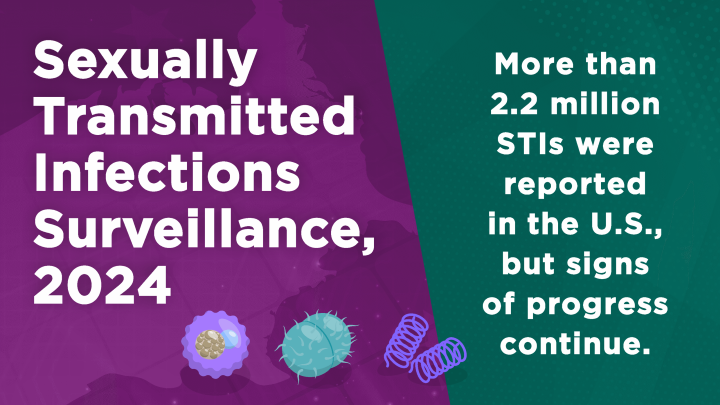CDC Releases 2024 National STI Data

Cross-posted from: CDC | NCHHSTP
Newly released 2024 STI surveillance data indicate the STI epidemic touches nearly every community and while there are signs of progress, the STI burden remains substantial.
Dear Colleague,
Today, CDC released Sexually Transmitted Infections (STI) Surveillance, 2024 (Provisional), providing the latest national data on trends for three nationally notifiable sexually transmitted infections (STIs): chlamydia, gonorrhea, and syphilis, including congenital syphilis.
The overall U.S. STI burden remains substantial, but signs of progress continue.
In 2024, more than 2.2 million cases of chlamydia, gonorrhea, and syphilis were reported. While this represents a 9% decline in STI morbidity compared to 2023 (and the third consecutive year of decreases), there is still more work to do. Compared to a decade ago, the overall STI case burden in the U.S. remains 13% higher and reported congenital syphilis cases increased again last year for the 12th year in a row.
Other key findings from the surveillance data include:
- Chlamydia cases declined for the second year in a row (down 8% since 2023).
- Gonorrhea cases declined for the third year in a row (down 10% since 2023).
- Reported cases of primary and secondary syphilis, the most infectious stages of the disease, declined for the second year in a row (down 22% since 2023).
- Nearly 4,000 cases of congenital syphilis were reported in 2024 (up 2% since 2023), and congenital syphilis morbidity is 700% higher than it was a decade ago.
While the STI epidemic touches nearly every community, some geographic areas and populations may experience increases or decreases not reflected by the provisional 2024 national data.
We must accelerate progress and stop the most tragic consequences of the STI epidemic.
As our journey to protect the health and wellbeing of Americans marches forward, increased awareness of STIs, ongoing collective public health efforts for prevention and control, and increased use of innovations like STI self‑tests, newer point-of-care tests, and doxycycline as post-exposure prophylaxis for some bacterial STIs (doxy PEP), make a difference. Accelerating this progress requires empowering communities to prioritize STI control; modernizing our systems of care and prevention; advancing research to improve testing and treatment solutions; and continuing to support the public health workforce.
Your health and wellbeing matter, too.
I am energized by the tremendous will, drive, and determination of the dedicated health professionals throughout the country who tirelessly work to reduce the consequences of these preventable infections. It's important work, and I thank you for your persistence and commitment to the cause.
Thank you for your ongoing commitment to STI prevention in the face of ongoing challenges. We are making a difference.
/Bradley Stoner/
Bradley Stoner, MD, PhD
Director, Division of STD Prevention
National Center for HIV, Viral Hepatitis, STD, and TB Prevention
U.S. Centers for Disease Control and Prevention